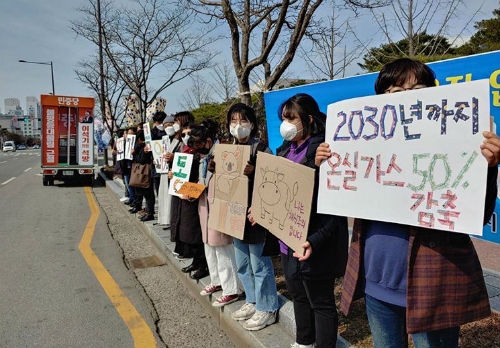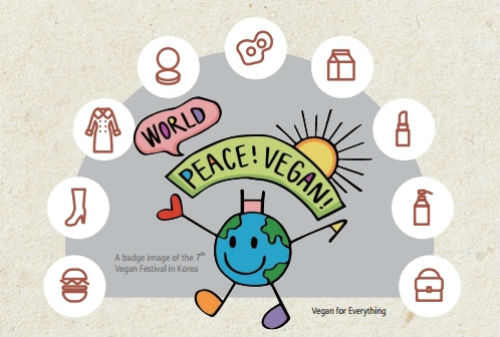
Nevertheless, Korea’s general perceptions of vegans remain the same due to stereotypes and prejudices, and there is not a proper system for these people compared to foreign countries. The lack of understanding and acceptance of vegans and vegetarians in the country makes it difficult for people to "chaeming-out". It is a combination of a Korean word for vegetarianism and coming-out, meaning notifying others that they are vegan. While the practice is emerging as a lifestyle choice, the Chonnam Tribune covered details about veganism and the life of Korean vegans to introduce the purposes of practicing veganism.

Life as a Vegan in Korea
The number of people practicing the vegan lifestyle has steadily increased, as it brings positive effects on health, and the vegan-related markets such as restaurants and bakeries have also been on the rise. However, social awareness and concern about vegans are not keeping pace. Many think that vegans are sensitive, picky eaters and less sociable than others. Consequently, vegans have felt uncomfortable with the situation and complained that it is still hard to find a restaurant that has a vegan option and a menu marked with food ingredients on it. Jeong Yu-dam, a 22-year-old resident of Gwangju said, "I think Korea is a really bad country for vegans to live in because most of the Korean foods are made with animal ingredients. All three meals a day in Korea are like battlefields for vegans to survive.” When buying goods at a market, they need to examine each ingredient because there is no vegan check mark on the package. Moreover, it is difficult to ask restaurants to cook without animal ingredients. An anonymous 24-year old resident of Gwangju said, “Due to the low awareness of veganism, it is inconvenient to check for animal products before ordering food in a restaurant. Moreover, I get timid whenever I find other people getting annoyed with me for checking every ingredient of food.”
Some vegans in Korea do not even reveal their identities at all to avoid awkward situations they might confront. Male vegans, in particular, are suffering with a stereotype of people that veganism is a women’s thing. They are even being suspected of lacking masculinity and being asked rude and ignorant questions. Furthermore, Korean vegans have difficulty in group life since there are no vegan options for meals at school, military or hospital meals. Last year, it became an issue when three men who were about to join the military demanded that the military guarantee vegetarian options for the soldiers. They argued that vegan soldiers are trained without a normal meal and are under intense mental stress, and vegetarian options are related to their right to eat and should be guaranteed by the state. Some people sympathize with their demands and show positive responses, but many others are negative, which has been controversial so far. Jeong commented, “I think Korean groupism is tough. I am often treated as a weird person just because I don’t eat food that is made with animal ingredients. I'm stressed out about the many situations in which I have to eat with a group where I belong and their evaluation of me after finding out about my eating habits.”

Going Vegan to Protect Animals
As people’s interest in animal welfare increases, more and more people are becoming vegans to protect animal rights. In fact, statistics recently released by a German market research institute showed that 61 percent of vegans changed their food choices because of animal welfare. They sympathize with the pain of animals being raised to become meat, and being given toxic substances to experiment with cosmetics ingredients. A 22-year-old anonymous person said, “When I was in high school, I felt uncomfortable eating meat after talking about animal rights with my friends and reading a book by Writer Han Kang. I started to practice veganism because I felt like I was eating myself.” An increasing number of people have begun to practice veganism such as vegan-fashion and vegan-cosmetics. They refuse to use products that exploit animals, avoiding clothing made of animal fur and skin, and cosmetics that have been tested on animals. Vegan-fashion is a good fashion that prevents indiscriminate animal sacrifices by not using animal hair or leather, changes the flow of consumption and uses eco-friendly materials. Vegan-beauty products contain no animal products or animal-derived ingredients in their creation. Choi Ji-Yul (Junior, Dept. of Environment Energy Engineering) said, “Whenever I buy cosmetics, I've been exposed to a lot of vegan products. I think that vegan-beauty and vegan-fashion are good phenomena in opposition to animal testing.”
Veganism is becoming a global trend in related fields. The Los Angeles City Council passed an ordinance banning the production and sale of animal fur products in Los Angeles. In New York, Milan, Paris, and London Fashion Week, there are no longer fur-lined garments on show, and many luxury brands such as Chanel, Gucci and Armani have also stopped using animal hair. In addition, the Korean vegan-fashion brand ‘Vegan Tiger’ has proposed a fashion line with the slogan ‘cruelty free’ to end the suffering of furry animals and give consumers wider options. They sell higher quality and sophisticated designs than actual fur products, and part of the profits will also be donated to animals and the environment.

Vegan Living to Save the Planet
Another reason to practice veganism is to protect our environment. In August 2019, the Intergovernmental Panel on Climate Change reported that meat is fueling global warming. Meat eating is one of the main causes of carbon emissions. Greenhouse gases generated by meat production reached 18 percent, producing more than the combined amount of transportation, which recorded 13.5 percent. The easiest and quickest action by individuals is to choose a vegetarian diet. That is why there is a growing number of people who transition to a vegan lifestyle. Scientists say that it can be difficult to prevent the climate crisis unless meat consumption is reduced and converted to a vegetarian diet, judging that if the world's population were all vegan, it could reduce eight billion tons of carbon dioxide each year. Cho Keal-Ye, Representative of Vegan Climate Action Network, also said, "People are beginning to feel the seriousness of the current situation where the Greenland Ice Sheet melts more than 100 times faster than before, the Australian wildfire hasn't been caught for more than four months, in order to overcome the crisis the citizens will have to make an effort to overcome climate change as a priority. Otherwise, we may lose our precious home."
Vegans also take part in climate crisis emergency action. These protests take place all over the world, and in many parts of our country. In Gwangju, citizens are also taking action to overcome the climate crisis every Friday. Jeong who participated in the protests said, “I found out about the protests against the climate crisis and took part at city hall. The protests call for the government and the metropolitan city of Gwangju to declare a climate crisis, which have no policies to deal with the current climate crisis. I hope more people will be interested in the climate crisis.” In addition, efforts to protect the environment are taking place worldwide. In Western Europe, the governments are considering introducing meat taxes and related legislation to counter climate change, while Goldsmith, University of London has removed beef from its campus, and the Netherlands has been serving meat or fish only on demand at an education ministry event since last year. After realizing the seriousness of the climate crisis, people around the world who worry and act for the future are actively staging climate crisis protests and becoming vegan to save our planet.
Thinking of Shifting to a Vegan Lifestyle
Practicing veganism is an act of showing the values vegans seek. Even if it started from a health perspective, as he or she lives as a vegan, one gradually becomes more aware of the meaning of one’s actions and naturally expands the inner changes to various areas. There are lots of people around the world choosing to live life as a vegan and there is a veganism craze worldwide. It is not a temporary trend, but an irresistible global trend. Living as a vegan does not mean grandiose or great things, but just different ways of life that each person chooses, as they live in a house decorated with their own tastes. There are many people who feel unfamiliar and think only negatively when they hear the word vegan. The start of veganism is to pay attention to the process by which food or things come before me. Yang Yoon-ah, CEO of Vegan Tiger said, “There’s no one who wants to hurt life on purpose and damage the environment. I think it is important to practice as much as you can such as being vegan at least once a week, no animal-testing cosmetics, less leather or fur clothing.”
By Ma Joon-hee, Tribune Reporter

